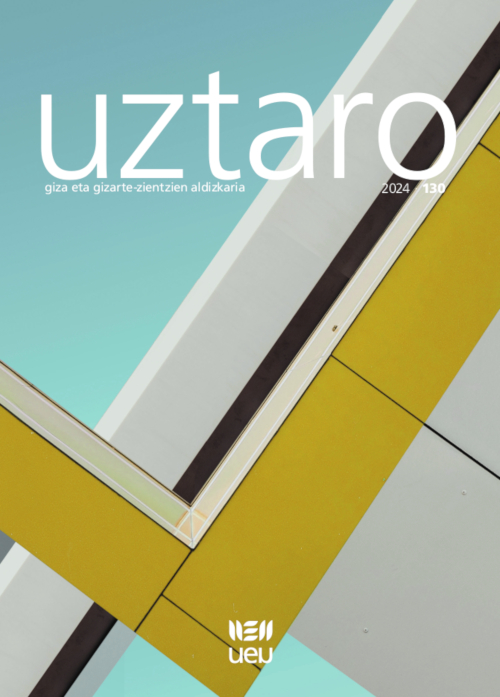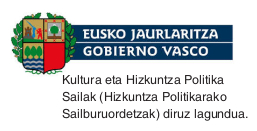Promoting coexistence and interculturality in the school through the World Café
DOI:
https://doi.org/10.26876/uztaro.130.2024.5070Keywords:
Intercultural Education, Sustainable Development Goals, World Café, School communityAbstract
One of the main challenges of education is to promote real coexistence and positive exchange between different cultures in the school community, turning the existing diversity into richness. In this research, we present the intervention held in a public school in Vitoria-Gasteiz, with the objective to encourage the school community to make proposals to promote coexistence and interculturality through a participatory process and to evaluate the usefulness of the World Café tool. We combined three tools: a questionnaire for families, a session based on the World Café tool, and a satisfaction questionnaire about the process. Results indicate that solidarity, equal rights, and non-discrimination are the main characteristics of the dream school that the school community has imagined throughout this participatory process. To achieve this, participants proposed creating spaces for meeting and getting to know each other and giving opportunities to acknowledging the different cultures present in the school.
Downloads
References
Adurtza Ikastola (2022/11/28). 2022-2023 Urteko Plana. Erreferentziak.
Bazilio, Jennifer et al. (2020). Generating meaningful conversation: World Café in strategic interprofessional planning in Continuing Education. Revista Brasileira de Enfermagen (REBEn), 73(5), 1-5. http://dx.doi.org/10.1590/0034-7167-2019-0279 DOI: https://doi.org/10.1590/0034-7167-2019-0279
Babbie, Earl R. (2014). The basics of social research. Cengage Learning.
Bernal, Aurora (2003). La educación entre la multiculturalidad y la interculturalidad. Estudios Sobre Educación (ESE), 4, 85-101. DOI: https://doi.org/10.15581/004.4.25629
Brown, Juanita eta Isaacs, David (2005). The World Café: shaping our futures through conversations that matter. Berrett-Koehler.
Bryman, Alan (2012). Social research methods. Oxford University Press.
Chang, Wen-Long eta Chen, Shih-Ting (2015). The impact of World Café on entrepreneurial strategic planning capability. Journal of Business Research, 68, 1.283-1.290. DOI: https://doi.org/10.1016/j.jbusres.2014.11.020
Coelho, Elizabeth (2016). Eskola kulturaniztunean irakastea eta ikastea. Euskal Herriko Unibertsitateko Argitalpen Zerbitzua.
Eiguren Munitis, Amaia et al. (2019). Belaunaldi arteko esperientziak hezkuntza formalaren testuinguruan: teoriatik praktikara. Uztaro, 110, 25-36. https://doi.org/10.26876/uztaro.110.2019.2 DOI: https://doi.org/10.26876/uztaro.110.2019.2
Euskal Herriko Unibertsitatea (2019). Agenda 2030 Garapen Iraunkorrari ekin. Euskal Herriko Unibertsitatea. https://www.ehu.eus/eu/web/iraunkortasuna/ehuagenda-2030
Eusko Jaurlaritza, Enplegu eta Gizarte Gaietako Saila (2010). Familia etorkinen eta eskolen arteko harremanetarako Jardunbide Egokien Gidaliburua. Eusko Jaurlaritzako Argitalpen Zerbitzua. https://www.ikuspegi.eus/documentos/documentos_externos/Familias%20inmigrantes%20E%20PR3.pdf
Eusko Jaurlaritza, Hezkuntza Saila (2019). Eskola inklusiboa garatzeko esparru-plana 2019-2022. Eusko Jaurlaritzako Argitalpen Zerbitzua. https://www.euskadi.eus/gobierno-vasco/-/libro/eskola-inklusiboa-garatzeko-esparru-plana-2019-2022-plan-marco-para-el-desarrollo-de-una-escuela-inclusiva-2019-2022/
EUSTAT (2022a). Vitoria-Gasteizen datu estatistikoak: Biztanleria. https://eu.eustat.eus/municipal/datos_estadisticos/vitoria_gasteiz.html
EUSTAT (2022b). Población de la C.A. de Euskadi por barrios de los municipios de más de 10.000 habitantes, según sexo, grupos de edad y nacionalidad. https://www.eustat.eus/elementos/ele0013700/poblacion-de-la-ca-de-euskadi-por-barriosde-los-municipios-de-mas-de-10000-habitantes-segun-sexo-grupos-de-edad-ynacionalidad/tbl0013711_c.html
Fouché, Christa eta Light, Glenda (2010). An Invitation to Dialogue: «The World Café» In Social Work Research. Qualitative Social Work, 10(1), 28-48. DOI: https://doi.org/10.1177/1473325010376016
Hatch, J. Amos (2023). Doing Qualitative Research in Education Settings. State University of New York Press. DOI: https://doi.org/10.1515/9781438494623
Jamsen, J., eta Corley, Kevin G. (2007). E-survey methodology. In Rodney A. Reynolds, Robert Woods eta Jason D. Baker (argtz.), Handbook of research on electronic surveys and measurements (1-8. or.). Idea Group Inc (IGI). https://doi.org/10.4018/978-1-59140-792-8.ch001 DOI: https://doi.org/10.4018/978-1-59140-792-8.ch001
Kylmicka, Will (2004). Justice and security in the accommodation of minority nationalism. In Stephen May, Tariq Modood eta Judith Squires (argtz.), Ethnicity, Nationalism and Minority Rights (144-175. or.). Cambridge University Press. https://doi.org/10.1017/CBO9780511489235.008 DOI: https://doi.org/10.1017/CBO9780511489235.008
Leccardi, Carmen eta Brugué, Quim (2014). Participación ciudadana para construir ciudadanía y cohesionar la sociedad. MONOGRÁFICO: Asociación Internacional de Ciudades Educadoras.
León Hernández, Irati et al. (2020). Haur Hezkuntzan genero-ikuspuntutik egiten den lanketa. Uztaro. Giza eta gizarte-zientzien aldizkaria, 112, 41-61. DOI: https://doi.org/10.26876/uztaro.112.2020.3
Llevot Calvet, Nuria eta Bernad Cavero, Olga (2015). La participación de las familias en la escuela: Factores clave. Revista de la Asociación de Sociología de la Educación (RASE), 8(1), 57-70. https://repositori.udl.cat/items/4f042001-a485-4265-81a3-
bed18f07bdf4
Likert, Rensis (1932). Technique for the Measurement of Attitudes. Columbia University Press.
Lorenzetti, Liza A.; Azulai, Anna eta Walsh, Christine A. (2016). Addressing Power in Conversation: Enhancing the Transformative Learning Capacities of the World Cafe. Journal of Transformative Education, 14(3), 200-219. DOI: https://doi.org/10.1177/1541344616634889
López-Vélez, A.L. (2018). La escuela inclusiva: El derecho a la equidad y la excelencia educativa. En busca de la equidad y la excelencia. Euskal Herriko Unibertsitateko Argitalpen Zerbitzua.
Loyola Bustos, Christian (2020). La participación educativa como una herramienta de mejora. Foro educacional, 34, 35-51. https://doi.org/10.29344/07180772.34.2359 DOI: https://doi.org/10.29344/07180772.34.2359
McDermott, Mairi et al. (2020). A World Café Discussion on Well-Being: Considerations for Life in the University. The Canadian Journal for the Scholarship of Teaching and Learning, 11(2). DOI: https://doi.org/10.5206/cjsotl-rcacea.2020.2.8337
Nazio Batuak (2015). Transforming Our World: The 2030 Agenda for Sustainable Development; Division for Sustainable Development Goals.
Oleaga Páramo, Antonio (2017). Haur eta gazteen aniztasuna EAEn: (Oker izendatutako) bigarren belaunaldiak. Euskal Herriko Unibertsitateko Argitalpen Zerbitzua. https://www.ikuspegi.eus/documentos/investigaciones/2G/Haur_gazteen_aniztasuna_EAE.pdf
Perales-Fernández-de-Gamboa, Andrea; Arregi Orue, Joseba Iñaki; Escalante Mateos, Naiara; Palacios Agundez, Igone (prentsan). La formación docente con perspectiva intercultural a través de la asignatura Gestión de Proyectos Específicos: Construyendo puentes entre Universidad, escuela y comunidad. Rompiendo Barreras: Lenguaje, Cultura y Tecnología en la Educación Inclusiva. Tirant lo Blanch.
Pérez Grande, María Dolores; García del Dujo, Ángel eta Martín García, Antonio Victor (1999). Prejuicios, estereotipos y otras profecías autocumplidoras: un reto para la educación intercultural. Pedagogía social: revista interuniversitaria, 3, 125-146.
Ponce, Omar A. eta Pagán-Maldonado, Nellie (2015). Mixed Methods Research in Education: Capturing the Complexity of the Profession. International Journal of Educational Excellence, 1(1), 111-135. DOI: https://doi.org/10.18562/IJEE.2015.0005
Rapanta, Chrysi eta Trovão, Susana (2021). Intercultural Education for the Twenty-First Century: A Comparative Review of Research. In Fiona Maine eta Maria Vrikki (argtz.), Dialogues for Intercultural Understanding. Placing Cultural Literacy at the Heart of Learning (9-26. or.). Springer. DOI: https://doi.org/10.1007/978-3-030-71778-0_2
Recchia, Virginia et al. (2022). A critical look to community wisdom: Applying the World Cafe method to health promotion and prevention. International Journal of Health Planning and Management, 37(1), 220-242. DOI: https://doi.org/10.1002/hpm.3594
Retortillo Osuna, Álvaro eta Rodríguez Navarro, Henar (2008). Actitudes de aculturación y prejuicio étnico en los distintos niveles educativos: un enfoque comparado. Revista electrónica interuniversitaria de formación del profesorado, 11(2), 1-11.
Sabariego Puig, Marta (2002). La educación intercultural ante los retos del siglo XXI. Desclée de Brouwer.
Saenz del Castillo, Aritza et al. (2021). Giza eskubideetarako hezkuntza gatazka osteko gizartean. Teoriatik praktikara. Uztaro. Giza eta gizarte-zientzien aldizkaria, 117, 55-73. DOI: https://doi.org/10.26876/uztaro.117.2021.3
Sáez de Cámara, Estibaliz; Fernández, Idoia eta Castillo-Eguskitza, Nekane (2021). A holistic approach to integrate and evaluate sustainable development in higher education. The case study of the University of the Basque Country. Sustainability, 13(1), 392.
https://doi.org/10.3390/su13010392 DOI: https://doi.org/10.3390/su13010392
Leiva Olivencia, Juan José (2012). La formación en educación intercultural del profesorado y la comunidad educativa. Revista electrónica de investigación y docencia (REID). https://revistaselectronicas.ujaen.es/index.php/reid/article/view/1148
UNESCO (2012). Educación en derechos humanos en la escuela primaria y secundaria: guía de autoevaluación para gobiernos. Naciones Unidas.
UNESCO (2015). Educación para la ciudadanía mundial: temas y objetivos de aprendizaje. Organización de las Naciones Unidas para la Educación, la Ciencia y la Cultura. DOI: https://doi.org/10.15381/anales.v45i3-4.6061
UNESCO (2017). Garapen Iraunkorrerako Helburuetarako Hezkuntza: Ikaskuntza-helburuak. https://www.ehige.eus/wp-content/uploads/2020/02/Garapen-Jasangarriaren-Helburuetarako-Hezkuntza-gida-UNESCO.pdf
License
Copyright (c) 2024 Unai Coronel Gastiain, Igone Palacios Agundez, Andrea Perales-Fernández-de-Gamboa, Arantza Rico Martinez

This work is licensed under a Creative Commons Attribution-NonCommercial-ShareAlike 4.0 International License.




















